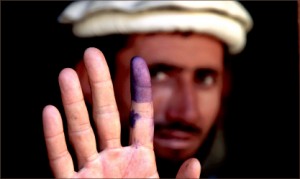Afghanistan: a victory for the US, women

The recent presidential election in the Middle East may be a sign that the region is making increased progress
I saw the headlines, and it was as if I was reading a fantasy, something that could not be true—under any circumstances.
As I have Googled information about the Afghani election, I have been met with headlines calling the day at the polls a “victory,” “success,” “shock” and, the most surprising of all, “relatively peaceful.”
The presidential election, held April 5, was a grandiose display of patriotism. This second national vote displayed an unequivocal desire to see the nation’s seemingly innumerable woes resolved. Among all of the victories, the United States and Afghani women were big winners.
The power and presence of the Taliban seem to have diminished, a topic many speculate for different reasons.
According to Michael Kugelman of the Huffington Post, it is because the Taliban is worried about its image and wants to have a better standing with the coming administration as a political entity.
Others have said it is because of the United States’ “War on Terror” that has weakened the power of the Taliban. In either case, this is a time of great opportunity for the West and for women.
America’s engagement in Afghanistan has produced great successes. According to the U.S. embassy in Kabul, the U.S. Agency for International Development (USAID), in collaboration with the Afghan government, has built more than 680 schools since 2002, enrolling nearly 7 million students. Of those students, 37 percent of them are female. This stands in stark contrast to 2001 when the Taliban still ruled the nation, and less than one million students were in school—and not a single one of them was a girl.
For women, this was a major shift from the heavily patriarchal Afghanistan. In an era where the rules of the Taliban seem to be dwindling, three women threw their name in for vice president.
“Of course, to be in politics as a woman is a risky task,” Dr. Habiba Sarabi, first female governor in Afghanistan’s Bamiyan province and vice presidential candidate, said in The Independent, a British news source. “But we have to take the risk, otherwise we cannot achieve our goal. We cannot expect everything can be soft or everything can be clear on our way.”
Ashraf Ghani, the frontrunner for president, has broken an age-old tradition by including his wife, Rula Ghani, in his campaign. Rula Ghani claims to be a Lebanese Christian and has been called the “most Westernized woman among the Kabuli elite,” by several Afghani news sources.
Educated in the United States, Ashraf Ghani is the former finance minister of Afghanistan and the former chancellor of Kabul University. He is known as a scholar of political science and anthropology, and he worked at World Bank on international development assistance.
Ashraf Ghani has agreed to sign President Barack Obama’s agreement to keep foreign troops in the country after their scheduled withdrawal date at the end of 2014. The United States’ continued presence is critical for the continued advancement of freedom.
Afghanistan’s women know that, and they took their civic duty seriously. According to the Independent Election Commission of Afghanistan, 35 percent of the 16 million voters were women.
With the coming of a new regime, Afghanistan and the U.S.—along with the rest of the Western leaders—have the opportunity to forge strong relationships and continue moving into greater freedom.
The final results of the election are not expected for a couple weeks, and there are bound to be many bumps along the way. The Taliban is not gone, and radical Islam is still around. However, there has been great progress.
All in all, I am proud of our armed forces, hopeful for the Afghani people and optimistic that long-term efforts to build strong alliances in the Middle East will be launched in this great window of opportunity.

